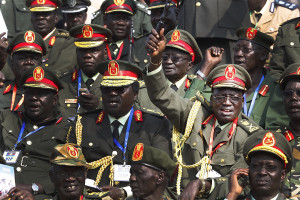
*Content Warning: The following piece includes graphic content, including descriptions of sexual violence*
On February 23, the UN released a report on human rights abuses that detailed Sudanese soldiers as perpetrators in the five-year conflict. The report implicated at least 40 military officials in war crimes and crimes against humanity. There have been several accounts of gang rape, other forms of sexual assault, and execution of civilians.
This information is not new. It has been widely known for years, yet neither the South Sudanese government nor the international community has adequately responded. Before its independence from Sudan in 2011, the United States had sanctions in place on Sudan due to its atrocities in South Sudan and Darfur – but they were removed in 2017. Despite that move, the United States placed oil sanctions on 15 South Sudanese oil operators on March 21. Although the South Sudanese government stated that these sanctions would hinder their plans to increase their oil production, the U.S. Department of State stated that “The South Sudanese Government, and corrupt official actors, use this revenue to purchase weapons and fund irregular militias that undermine the peace, security, and stability of South Sudan.”
The unsettlingly lax approach to the South Sudanese military’s human rights abuses leaves little hope that the information being prepared for a presentation to the UN Human Rights Council will yield tangible results. It is important to note that the UN has already condemned these crimes, although this is the first time they have uncovered any specific details. There have not been any real punishments to the government of South Sudan, and although the country has been urged to bring consequences upon perpetrators, very little action has been taken. Human rights observers are hoping that a African Union-South Sudan hybrid court, which would be responsible for legal investigation of human rights abuses, will be established soon, but it is unlikely that action will actually be taken.
Impunity has plagued human rights efforts for the past century. People continue to be horrified by crimes, but they do not take appropriate action to prevent them from occurring in the future. Thus, the cycle of human rights abuses continues.
The situation in South Sudan is particularly precarious now, as, in addition to violence, people also face famine. A comprehensive solution is difficult to formulate, as efforts to punish South Sudan’s government could worsen the situation and hurt the people of South Sudan even more. Now, more than ever, action must come from within.
The situation of South Sudan is not unique. These crises often exist in cycles, and it is nearly impossible to restabilize a country through one individual effort. At the same time, external punishment can be dangerous to the people currently living through the crisis. Even humanitarian aid organizations can perpetuate the very problems they are meant to alleviate (see recent reports of sexual abuse within the ranks of Oxfam and the Red Cross). It is therefore crucial that thought be put into sustainable solutions and accountability for all abusers.
South Sudan has been in turmoil and instability for the past five years, and has become a vacuum for human rights abuses. What it needs right now is thought and care to solve the deeply-rooted problems that have been ignored for far too long.
–
Mira Mehta is a writer and a student at Westfield High School. In her spare time, she enjoys debating and running on the track team. This is her first year as a member of the Communications Task Force at STAND.

